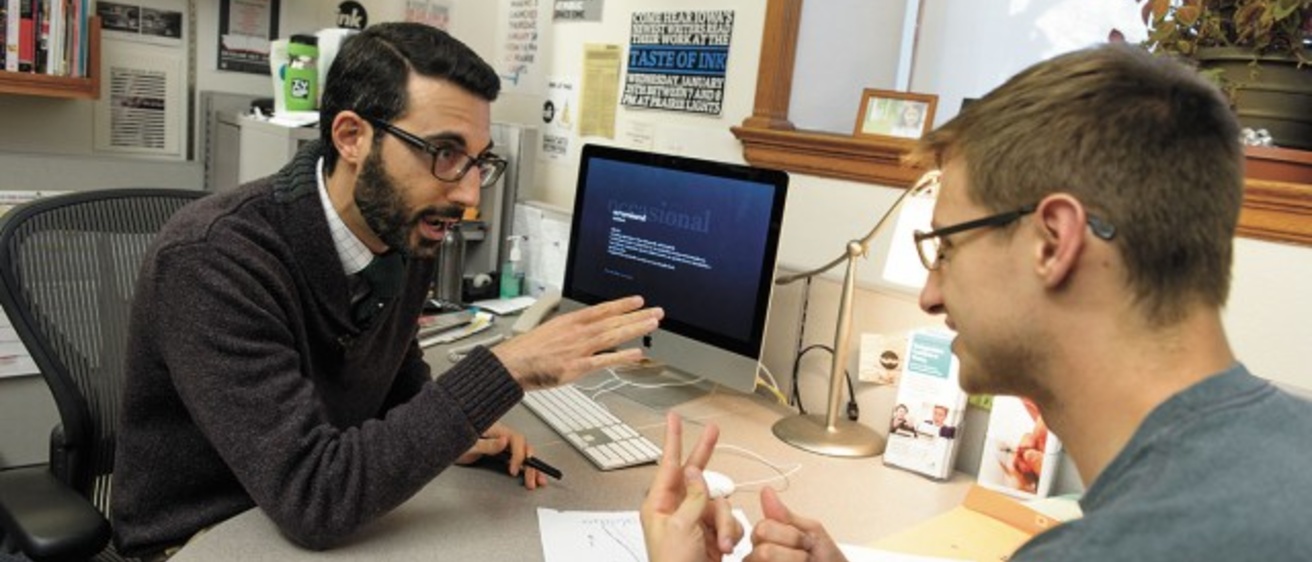Ben Lederer figured it would be his degree in finance from the University of Iowa that would land him a job with an investment firm.
No doubt, his degree from the UI’s prestigious Tippie of College of Business garnered him special attention from the many prospective employers who contacted him.
The Writing University will be swarming with younger-than-usual aspiring writers on Friday, April 24, thanks to a conference hosted by the Iowa Youth Writing Project, part of the Frank N. Magid Center for Undergraduate Writing in the College of Liberal Arts and Sciences.
But there was something else on Lederer’s résumé that earned him a second look: an Undergraduate Certificate in Writing from the UI, home to the top-ranked writing program in the country.
“The potential employers were impressed that I had received a writing certificate,” says Lederer, who graduated in December 2014 with a degree in finance and accepted a position with Fisher Investments in Portland, Oregon.
Though Lederer is starting his job at Fisher talking with clients and managing their accounts, eventually he will write reports. His writing skills gave him an advantage over other applicants.
That’s the beauty of the Undergraduate Certificate in Writing, which is offered through the Frank N. Magid Center for Undergraduate Writing at the UI College of Liberal Arts and Sciences. Students of all majors can benefit from the university’s numerous writing programs by pursuing writing courses related to their majors, career goals, or personal interests.
Frank N. Magid Center for Undergraduate Writing
Established in 2011 through a gift from UI alumna Marilyn Y. Magid and her family in Cedar Rapids, the center honors the late Frank N. Magid, who believed writing was a key component of a liberal arts and sciences education and a successful career. The center is home to:
The Undergraduate Certificate in Writing: Students in any major can enroll in this certificate program to pursue writing related to their majors, career goals, or personal interests.
The Iowa Writers Living-Learning Community: First-year students in this living-learning community enroll in one common workshop-based course and participate as a group in various writing/literary activities.
Ink Lit Mag: An undergraduate literary journal published twice a year by residents in the Iowa Writers Living-Learning Community.
earthwords: A print literary journal that showcases the creative works of UI undergraduates in literature and the arts.
The Iowa Youth Writing Project: A nonprofit initiative led by UI faculty, staff, and student volunteers who conduct writing and creative-learning workshops with youth across Iowa.
To learn more, visit magidcenter.uiowa.edu or contact director Daniel Khalastchi at magid-writing@uiowa.edu or call 319-384-1328.
While in the program, students take a minimum of 21 semester hours of approved writing courses that help them develop skills in a wide range of genres and for varied purposes. Students can select courses in creative writing, such as fiction, poetry, nonfiction, and playwriting, as well as those in scientific and technical writing. There are also courses in grant writing and writing for fields such as business, journalism, science, and the arts.
The program ends with each student completing a large-scale, independent capstone project or portfolio.
Daniel Khalastchi, associate director of the Magid Center for Undergraduate Writing, says the center opened in 2011 with the writing certificate program, but has since grown to include other writing and community service opportunities for students, including two student-run publications and a nonprofit.
“As the Magid Center grows and expands, our hope is to continue providing University of Iowa students with unique learning opportunities in the field of writing—both creatively and professionally—through the wide-ranging courses, work experience, and community outreach programs we offer,” he says.
For Lederer, who grew up in Clarinda, Iowa, the writing certificate has served him both personally and professionally.
“Going through the writing certificate program helped me utilize some of the creativity that I had but wasn’t using in business lectures,” he says. “I learned that I’m a pretty reflective person and at a time like college, when I was feeling new stresses and pressures, it was easy for me to write down some of the personal conflicts I faced.
“Ultimately,” he adds, “my reflective writing helped me realize who I was and how I was changing.”
By the time Skylar Moore graduates in May, she will have a bachelor’s degree in English as well as an Undergraduate Certificate in Writing, a Certificate in Entrepreneurial Management, and a Certificate in Nonprofit Management.
Her dream?
“I want to be the executive director of a nonprofit writing program,” says Moore, adding that the writing certificate allowed her to tailor the selection of writing courses to meet her needs.
When Moore first arrived at Iowa, she was motivated to do little more than go to class. The Magid Center for Undergraduate Writing changed that by offering her opportunities she credits with helping her grow up and build leadership skills. Among those opportunities were serving as editor-in-chief for earthwords, an undergraduate literary publication, and volunteering with the Iowa Youth Writing Project, a nonprofit initiative to inspire creativity in youth across the state.
But for Moore, who grew up in a family struggling to make ends meet in the Quad Cities area, the center for writing also allowed her to embrace her experiences and use them to her advantage.
“When I started the writing certificate program, I had no idea what I really wanted to do with myself,” she says. “Mostly, I was concerned with running away from and hiding the fact that I grew up poor.
“Over the course of the certificate program,” she continues, “I came to accept my upbringing as something that formed me, and I now wear it with pride. By having asked more of myself than what felt comfortable with, I feel I now can motivate people to ask more of themselves.”
